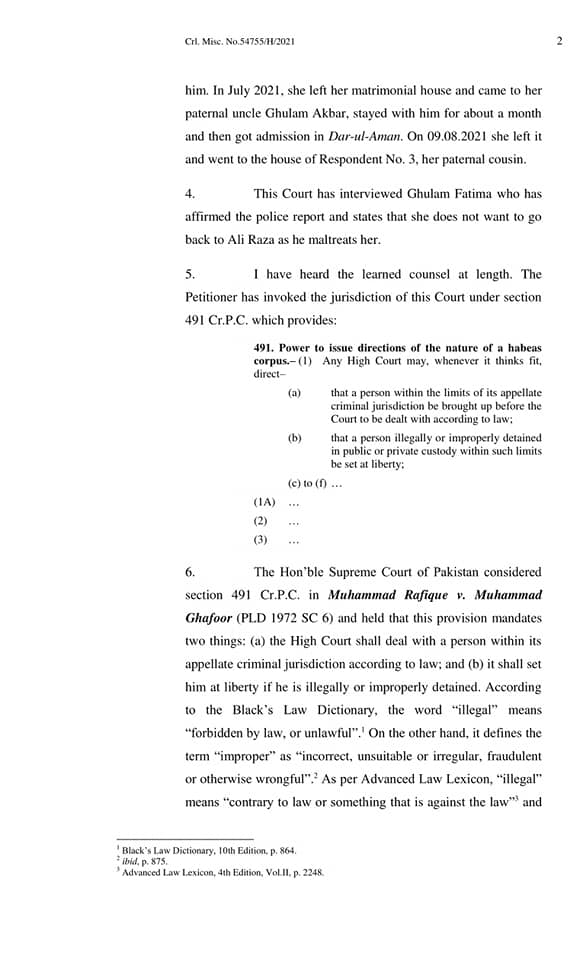(i) If the person is a minor, the court may make over his custody to the guardian who would deal with him in accordance with law;
(ii) If the person is a major, whether the custody is public or private, the court must set him at liberty forthwith. However, it cannot restore status quo ante against the wishes of the detenue because that would curtail his liberty 6and impinge on the fundamental right guaranteed under Article 9 of the Constitution of Pakistan, 1973.
The jurisdiction of the High Court under section 491 Cr.P.C. [and the Sessions Judges and the Additional Sessions Judges under section 491(1A) Cr.P.C.] is governed by the following principles which have settled over time:
i) Writ of habeas corpus is of ancient origin and, as distinguished from other prerogative writs, it is one of right and not mere discretion.
ii) “Detention” does not merely relate to physical confinement in a small place. Any form of restraint on liberty is actionable.
iii) The jurisdiction under section 491 Cr.P.C. is exercised by the court to “restore” the custody of the detenue to the person where it rightfully and lawfully belongs. Before passing an order for the restoration of custody, the court must form a prima facie view that the custody from which the detenue is sought to be recovered is “illegal and improper”, and that there is real urgency in the matter.
iv) Under the Islamic law marriage is a civil contract and a Muslim girl is competent to conclude it on attaining puberty which, in the absence of evidence to the
contrary, is presumed on the completion of the age of fifteen years.
v) vi) vii) viii) ix) x) A girl who has attained puberty may contract marriage with a man of her choice and it is not necessary for her to obtain the consent of her Wali.
vi) Marriage with a minor who is below sixteen is not invalid but the person concerned may be prosecuted for an offence under section 363 PPC and/or the Child Marriage Restraint Act, 1929.
vii) Proceedings under section 491 Cr.P.C. are summary in nature. The court cannot determine legal status of the relationship between the parties. The court cannot determine the validity of the marriage on the touchstone of the Injunctions of Islam in the said proceedings.
viii) A sui juris woman cannot be kept in Dar-ul-Aman against her will.
ix) If the detenue is a sui juris girl or woman and is not willing to go with her husband or guardian, the court cannot compel her. She must be set at liberty and allowed to move freely. Wishes of the sui juris girl should be respected.
ix) Matter of custody of minor children can be brought before the High Court under section 491 Cr.P.C. only if they are of very tender age and have been removed from lawful custody in the recent past and there is a real urgency. Even in such cases the High Court may only regulate interim custody of the minors and leave the determination of final custody for the Guardian Judge. The High Court should exercise jurisdiction under section 491 Cr.P.C. for recovery of minors sparingly.
Islamic law uses the words Sabi or Saghir for minor. “Sabi means lad, youth, or boy while saghir connotes young, child, minor or major. It is the opposite of kabir which means grown-up, adult or old aged. In legal context, the term ‘majority’ means the particular age at which a person has the legal capability to undertake certain acts or when he/she will be held fully responsible for his/her acts and omissions … According to the majority of jurists, this capacity is only attained at puberty. It means that in Islamic law a person is a minor until he or she attains puberty.”
In Pakistan there is no uniform standard definition of age of majority. To this end, various laws prescribe different ages for exercising civil, political, economic, social rights or criminal liabilities. However, for our present purposes the Majority Act, 1875 (the “Majority Act”), is relevant. Section 3 thereof stipulates that every person domiciled in Pakistan shall be deemed to have attained his majority on attaining the age of 18 years but where a court has appointed or declared the guardian of the minor’s person or property, or both, or where the Court of Wards has assumed superintendence of his property, he attains majority on completing his age of 21 years.
Albeit the age of puberty is sometimes considered to mean the same thing as sui juris, it is not always so. As Muhammad Sadiq’s case elucidates, there is a distinction between the two concepts. Puberty enables a person to exercise rights regarding marriage, dower, divorce and adoption provided under the Islamic law but he acquires full legal competence when he reaches the age of majority stipulated by the Majority Act. Therefore, the term “sui juris” may be loosely applied when talking of one’s capacity in respect of the aforesaid matters but it has its real application when one becomes a “full person” and the law permits him to manage his affairs in entirety.
It is trite that in all matters relating to custody of minors the courts act in loco parentis and it is their legal duty to ensure their welfare. The question as to what is in the interest of a minor depends on the facts of each case. The welfare of a minor is not restricted to the child’s health, education and physical, mental and psychological development; it also includes his/her spiritual and moral well being. According to the Halsbury’s Laws of England, “a husband is at common law entitled to the custody of his wife against all other persons, and the writ of habeas corpus is available to a husband for the purpose of regaining the custody of his wife if she is wrongfully detained by anyone without her consent.”















0 Comments